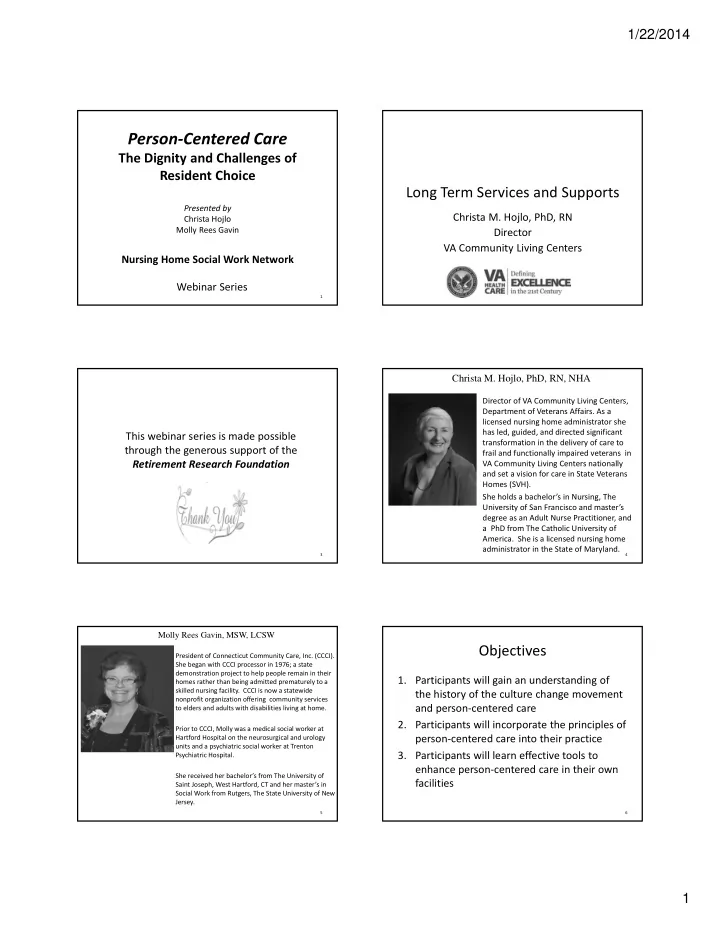

1/22/2014 Person ‐ Centered Care The Dignity and Challenges of Resident Choice Long Term Services and Supports Presented by Christa M. Hojlo, PhD, RN Christa Hojlo Molly Rees Gavin Director VA Community Living Centers Nursing Home Social Work Network Webinar Series 1 Christa M. Hojlo, PhD, RN, NHA Director of VA Community Living Centers, Department of Veterans Affairs. As a licensed nursing home administrator she has led, guided, and directed significant This webinar series is made possible transformation in the delivery of care to through the generous support of the frail and functionally impaired veterans in Retirement Research Foundation VA Community Living Centers nationally and set a vision for care in State Veterans . Homes (SVH). She holds a bachelor’s in Nursing, The University of San Francisco and master’s degree as an Adult Nurse Practitioner, and a PhD from The Catholic University of America. She is a licensed nursing home administrator in the State of Maryland. 3 4 Molly Rees Gavin, MSW, LCSW Objectives President of Connecticut Community Care, Inc. (CCCI). She began with CCCI processor in 1976; a state demonstration project to help people remain in their 1. Participants will gain an understanding of homes rather than being admitted prematurely to a skilled nursing facility. CCCI is now a statewide the history of the culture change movement nonprofit organization offering community services and person ‐ centered care to elders and adults with disabilities living at home. 2. Participants will incorporate the principles of Prior to CCCI, Molly was a medical social worker at person ‐ centered care into their practice Hartford Hospital on the neurosurgical and urology units and a psychiatric social worker at Trenton 3. Participants will learn effective tools to Psychiatric Hospital. enhance person ‐ centered care in their own She received her bachelor’s from The University of facilities Saint Joseph, West Hartford, CT and her master’s in Social Work from Rutgers, The State University of New Jersey. 5 6 1
1/22/2014 Welcome and Thank you How Did We Get Here? • 1980s ‐ consumer advocacy groups exposed substandard care in some nursing homes Your social work practice is on the • 1987 ‐ Congress enacted sweeping legislative cutting edge of culture change reforms—Omnibus Reconciliation Act encouraging individualized care • 1997 – The Pioneer Group coalesced to advocate for person ‐ centered care and “culture change” Principles of Person ‐ Centered Care How Do We Bring About Change? • Resident autonomy, direction and choice • Do your homework • Resident engagement – enhanced quality of • Carefully identify your allies life • Start small • Resident relationships with consistent staff who know them and recognize changes in • Educate yourself and others their condition • Role model appropriate behavior • Resident lives in a way that is meaningful • Advocate • Resident lives in an environment of trust and • Identify and celebrate success respect These Are Social Work Skills • Support resident in the identification of personal goals Long Term Services and Supports • Keep person at the center of the care for Person ‐ Centered Care planning/decision ‐ making process • Adopt motivational interviewing techniques • Engage in active and reflective listening • Concentrate on the individual’s affect and behavior 12 2
1/22/2014 New Populations Oh my, NO! I won’t be PUT there! New Language New Approaches Nursing Homes Placement – Where to “put” people Medical diagnoses as the framework for “placement” 13 14 Language is changing SERVICES • Population changes: • Diagnoses only provide clues to what is needed • The PERSON is NOT their diagnosis/diagnoses – Younger MEN and women – Skilled services • The diagnosis impacts how the person functions • Many “elders” do not want to be considered • Function determines need for SERVICES “geriatric” e.g. not everyone who has a stroke, needs to be in a nursing home OR even needs SERVICES • Options are expanding • New options = new opportunities to redefine elder, placement, individualization of care. 15 16 SERVICES New Imperative • To provide the SERVICES needed for the right • SERVICES are intended to mitigate the IMPACT reason, for right amount of time, in the right of the medical diagnoses/acute or chronic venue problem on the person’s ability to function – – ASSESS – To bathe, toilet, eat, remain mobile, or dress self • Impact of medical problem on function (ADL/IADL) (Activities of Daily Living (ADL)) • Social supports – To prepare meals, go shopping, use the telephone; • What specific interventions are needed such as wound conduct personal business; manage money care, physical therapy… (Instrumental Activities of Daily Living (IADL)) • Person’s personal history; suicidal ideation, history of drug or alcohol use 17 18 3
1/22/2014 VENUES for Services • Once upon a time there was only the nursing home but it is no longer the only game in town • Home and community based care – CCRC – Homemaker home health aid – Skilled nursing – Adult Day Health – Person ‐ Directed Care – Other community based SERVICES 19 Questions 4
Recommend
More recommend